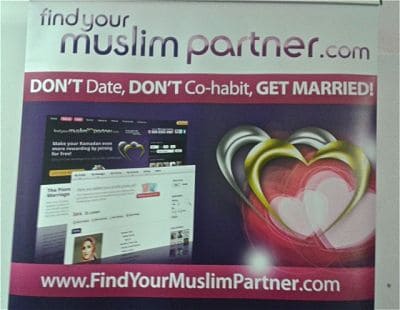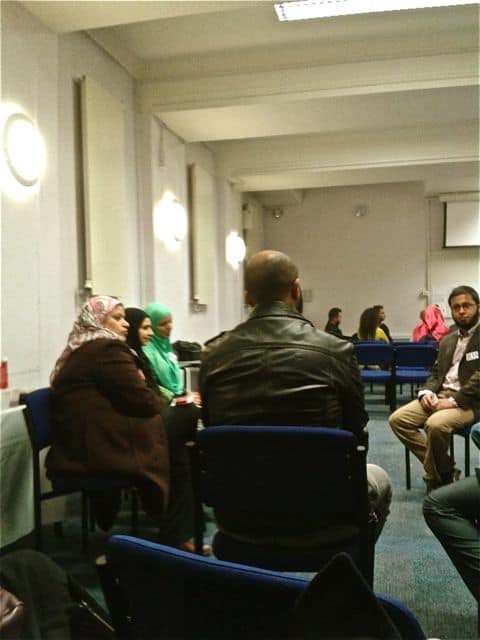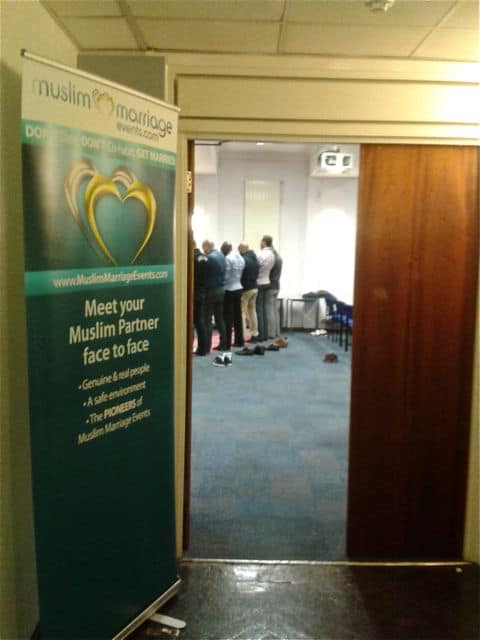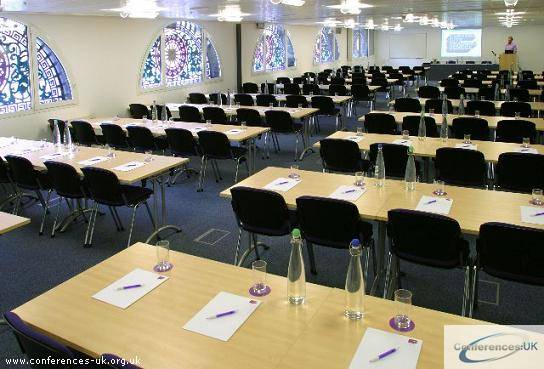The ‘marriage events’ organised by the Islamic Circles take place at Bircbeck College, in central London, usually on Sundays. These events are meant to provide a service to the Muslim community by helping single Muslims find the ‘right marriage partner’. On the poster installed at the entrance of the room, one can read: “Don’t date! Don’t Cohabit! Get Married!”. Mirzan Raja, the organiser, has run the Islamic Circle for the past 12 years. He is a 37-year-old father of two, born in England from Indian Muslim parents. Mirzan has been a board member of a shariah council a while back: it is this experience that made him aware of the need for such a service as more and more Muslims are getting divorced nowadays – a fact that reflects a broader trend within the general British population.
However, match making, even under an Islamic framework, remains controversial: Mirzan admits receiving regular threats from Muslims who consider his activity haram (illicit) and contrary to Islam. No later than last week, an angry woman spat at him during the marriage event he organised in the context of the Global Peace and Unity conference at ExCel. Nevertheless, the popularity of his events has not ceased to grow as the continuous flow of participants entering the room on this early Sunday afternoon testifies. Mirzan sites various reasons for this: parents are not always able to introduce potential spouses. Second and third generations are not very keen to marry a relative or someone coming from the ‘village’, poorly versed in English or/and poorly educated. The moral impossibility to ‘date’ in Islam and the central role of the ‘family unit’ in Muslim morality also play important roles in directing single Muslims towards these now popular ‘halal dating’ activities.
 In Mirzan’s view, the elders are not doing their job anymore, but are instead failing the younger generation with what he identifies as a ‘postcolonial mode of thinking’ that consists of blaming the British for everything that is wrong in the community: “Marriage is all this generation has left for them and look at the result: the number of divorces keeps on continually increasing! We need to have a Muslim Spring in England: we need to get rid of our Muslim leadership!” he exclaims.
In Mirzan’s view, the elders are not doing their job anymore, but are instead failing the younger generation with what he identifies as a ‘postcolonial mode of thinking’ that consists of blaming the British for everything that is wrong in the community: “Marriage is all this generation has left for them and look at the result: the number of divorces keeps on continually increasing! We need to have a Muslim Spring in England: we need to get rid of our Muslim leadership!” he exclaims.
Over the years, Mirzan has created a number of sub categories as he realised that the category ‘Muslim’ was too broad to meet the specific needs of certain groups within the community. He now organises special events for converts, Muslims over 40s, students, converts, professionals, Asian, Arabs, Bangladeshi…and with the rapidly growing presence of the French, now special events have been launched for them too. The event of today is dedicated to this new sub-category and gathers together a wide variety of ‘francophones’: Two brothers from Mauritius, a Senegalese man (the only black visitor) and a majority of British and French of North African origin. Mirzan regrets having to separate people according to their ethnic origin or nationality as he believes that what should unite Muslims is the notion of ‘ummah’ (the collective community of Islamic peoples). But as a pragmatist businessman, social entrepreneur and activist (these are the terms he uses to describe himself) he simply decided to answer the demand.
Prior to the event, participants have been sent various forms to fill in as well as documents explaining the event’s general principles. One of the documents is entitled ‘general etiquette’. Some lines attract my amused attention:
- Try to be in a state of ablution (wudû’) if possible.
- The best starting point is to recognise that you are a humble servant of Allah who is attending the event because you, like all the other participants, are looking for a spouse, and therefore want to behave in the best of manners.
- It is important to recognise that finding a suitable spouse is a massive problem for Muslims today. It has to be addressed practically, not just through lectures and seminars about the fiqhi (juristic) nature of marriage and the ideal scenario. Education of the whole community is required, including parents and even the ‘ulamâ who also need to work with social scientists such as marriage counsellors and psychotherapists to find realistic solutions. We hope that the marriage event will be a humble product of this. Such initiatives are new to the community, and they need to be tested within the framework of the Sharî‘ah. It will take time for us to fully understand them but they can only improve if people participate in them, take them seriously, facilitate their organisation, and provide constructive feedback.
- If I wear niqâb will I have to take it off? No, this is entirely your choice.
- Prayer facilities will be provided at the venue.
- Such events will continue being organised until masjids, Islamic groups, community elders and other married people start organising them.
- Make du’â and ask Allah for guidance before, after and during the event. Perform istikhârah prayer as and when appropriate.
Participants gradually fill the room. Some enter with siblings and friends who can quietly observe the session from the back of the room, after which ‘brothers’ are seated on one side and ‘sisters’ on the other. A mother scans men with an air of disapproval: “They are all over 40. Much too old for my daughter!” she complains as she takes a seat next to me, waving at her 26-year old daughter who already joined the group of ‘sisters’.
I see passing before my eyes a carnival of colourful hijabs. But uncovered women are also present, as well as men wearing jelaba with long beards or more mainstream blue jeans or suits. The dress code goes from the most conservative to the latest Islamic (or simply metropolitan) chic. Visitors are given a number as they register so that anonymity is preserved. Mirzan, who acts as the master of ceremony, wears a traditional shalwar kamiz and an Islamic cap on his head. At events designed for professionals, he tends to prefer the suit but today, he feels his role is more the one of an ‘elder’, a wise person trying to guide young people on their journey towards conjugal life. With his outspokenness, his occasional use of swearwords and relaxed attitude, he appears to me as a strange mix of an imam and a suburban businessman.
Endowed with an unquestionable charisma, Mirzan introduces participants to the ‘rules of the game’. During this 15 minute presentation, illustrated by power point slides flashing on a screen, participants will learn where and how to search for a spouse, how to write an effective profile of themselves, how to dress and present themselves to the opposite sex, as well as how to establish communication with a potential partner.
Mirzan wants to make it clear to everyone: looking for a spouse is a full time job. Like when one is hunting for a job, “one’s best allies are friends and family”. “Partners should be looked for everywhere: at the work place or at the university”, participants are told. “Re-building the Muslim nation is the best way to find a partner. Charity work is always a good option: when you give something out of pure generosity, you always get something back from Allah!”.
Be positive! No one will help you if you don’t help yourself first! As a Muslim, you have to be positive! Your family from now on is your cell phone and the internet! Success depends on three things: 1) your intention: you need to be ready for marriage, 2) your attitude: it has to be right, 3) success is from Allah!
An important step to ensure success is to write a ‘good’ profile. Hence cards are distributed to participants on which they are asked to mention their age,  their status (single, divorced etc) and explain what they are looking for and what they can offer. They can attach a photo too, if they want to be more easily identified. “ Writing a profile is like writing a CV: if you want to be successful, you have to get it right”. The key to writing a good profile, we are told, is to take the exercise seriously: “it’s a pain in the ass, but once you have done it right, you can use it over and over again!” And indeed, if participants are not successful today, they can join the database of singles on findyourmuslimpartner.com, a website also run by the Islamic Circle and where 50.000 Muslims are already registered.
their status (single, divorced etc) and explain what they are looking for and what they can offer. They can attach a photo too, if they want to be more easily identified. “ Writing a profile is like writing a CV: if you want to be successful, you have to get it right”. The key to writing a good profile, we are told, is to take the exercise seriously: “it’s a pain in the ass, but once you have done it right, you can use it over and over again!” And indeed, if participants are not successful today, they can join the database of singles on findyourmuslimpartner.com, a website also run by the Islamic Circle and where 50.000 Muslims are already registered.
Mirzan now moves on to address issues related to communication. He stresses that British people used to appreciate the romantic love manners of Victorians. He compares these to the chivalry code of Medieval France and makes reference to ‘courtly love’ deployed in the Three Musketeers. Although times have changed, Mirzan emphasizes that to certain extent, these ideals still apply. Hence, he encourages participants to adopt gracious ways of interacting with each other, provides examples of pleasant conversations (“I make dua for you”, “I wish the best for you”) and invites participants to follow up the meeting with a text message thanking the persons they have met.
He finally advises participants not to rush and start plan a marriage date right away, even this very day. “Calm down, relax! There is no rush! You need to keep in mind that the long-term goal in the end is to lead a God-conscious lifestyle. If you’re looking for a spouse, you have to enjoy the process! You can’t be obsessed or depressed. And remember: getting married is in the hands of Allah!”
Participants are given an extra minute to finalise their profile cards, before being divided into three groups for an ‘ice breaking’ exercise. People are asked to briefly introduce themselves and answer questions that Mirzan throws at them as he passes from one groups to the next: what is your favourite film? Can you cook? What is your favourite food? How do your friends and relatives describe you? Do you like travelling?
Since the event has been advertised as a Muslim marriage event, everyone wants to present himself/herself as a good believer. This performance is like a competition for who will appear as the most pious. A young woman explains that she tries not to listen to music because she thinks it is ‘haram’ (illicit, forbidden). A man says that his favourite activity is to enjoy quality time with family. Another woman says that the last film she saw was The Butler, a film she considered as “very decent, very appropriate”…and she repeats these adjectives several times in her later exchanges. Most participants are quite shy (or is it part of the performance?) and try not to look at members of the opposite sex straight in the eyes. Altogether, the atmosphere is one of tangible politeness and propriety.
In the event it is the role of the men to move in between groups while women remain seated and immobile. After the full circle is completed, participants write down the number of the person he/she liked and with whom they would like to have a one-on-one conversation later on. A new group of men then joins the group, and introductions start again from scratch.
Everything occurs in perfect harmony, until suddenly something unexpected occurs:
Let’s cut the crap!” exclaims a young woman in her twenties wearing a hijab intricately wrapped around her head, serpent-print high heels and a lace top over a skinny pair of jeans, obviously loosing her patience. “What do you want from me if I were to become your wife?
An almost tangible gasp spreads in the room and everyone in the group seems taken aback. Apparently, this is not the first event that the same woman is attending and by now she clearly has no more time to waste. She wants someone who is honest and clear about his expectations, someone who is capable of articulating the way he envisions his future marital life.
Such a straightforward way of expressing one’s wishes and intentions is certainly at odds with the general demeanor of feminine modesty and self-containment that such events want to promote, even though most women tend to have greater social abilities in comparison to men who struggle (and sweat!) to find something appropriate to say.
“We are all here because we are Muslims! So I can say that I make my five prayers everyday and I am looking for a spouse who can help me strengthen my deen”, Faysal tentatively argues in a courageous attempt at re-establishing harmony.
Mirzan, who sense there is electricity in the air, approaches the group where tensions have erupted and advise everyone to avoid deferring pressing questions. ‘Marriage is not about love! It is about sharing common values and understanding each other!”, he explains, trying to encourage participants to put their shyness aside and ask the other participants the kind of questions that matter to them.
One by one, the visitors rattle off their wish-lists. Amir from Bristol wants “someone who has patience and a basic understanding of the religion”. Alia, a businesswoman from east London, is looking for “someone honest and supportive who likes to travel”. Tahzeen, a 27-year-old charity worker, wants to marry “someone down-to-earth, with a sense of humour, who will encourage me in my religion”.
 As the ‘ice breaking’ exercise comes to an end, participants go and have a look at the profile cards displayed on the wall to make their decision on the ones most apt to fulfil their spousal dream. “Any luck? Is there anyone you’d like to talk to?” I ask a woman wearing a flashy red hijab. She replies that she’d rather wait for a man to make the first move: she does not want to humiliate herself. But then she smiles and whispers: “Don’t turn back now! In fact I quite like the man with the blue shirt behind you”.
As the ‘ice breaking’ exercise comes to an end, participants go and have a look at the profile cards displayed on the wall to make their decision on the ones most apt to fulfil their spousal dream. “Any luck? Is there anyone you’d like to talk to?” I ask a woman wearing a flashy red hijab. She replies that she’d rather wait for a man to make the first move: she does not want to humiliate herself. But then she smiles and whispers: “Don’t turn back now! In fact I quite like the man with the blue shirt behind you”.
Some couples are already chatting in the room next door, while a group of men is having the Asr prayer in the main room. A line of carpets is displayed on the floor and men start making the sajda moves, as if trying to recharge sincere devotion after this episode of enforced gender mixing that seems to have emotionally exhausted them. I hang out in the corridor, waiting for opportunities to chat. Soon I come across Fazel, a French Algerian trader in his thirties, who is about to leave the room. I ask him whether he would not like to wait a bit longer to check whether someone is interested in him.
– You see, I don’t really think these events are for me. I am not that religious and everyone here seems to be so… conservative.
– So why did you choose a Muslim marriage event then? I ask
– Well…I have had British girlfriends in the past and…to be totally honest with you: they really drink too much!
In a corner of the room, a Senegalese man (the only black participant) is reading the Koran. No one accepted to talk to him. In spite of all the nice talk about the ‘ummah’, race IS a tangible barrier when it comes to marriage. I feel sorry for him and therefore decide to approach him and have a chat. I learn that it is the first time he attends such an event. He used to be married to a Senegalese woman who joined him in London, but he divorced her two years ago and is now ready to move on. “This time, I do not want to make the same mistake. I need to find someone from here! But it’s not easy when you’re black!”, he complains.
I realise that the event has attracted a significant number of divorcees, many of whom are now trying to find Mr or Mrs Right by themselves instead of having their marriage arranged by siblings. If divorce remains to an extent a ‘taboo’ (especially for women), the status of divorcees has significantly improved over the past fifty years. Some divorced women with children are also re-considering their conception of marriage.
According to Mizan, many of them are increasingly electing to become “co-wives” – in other words, to become a man’s second or third wife. Mirzan says he gets five to ten requests every week from women who are “comfortable with the notion of a part-time man”. He explains: “Career women don’t want a full-time husband. They don’t have time.” Expectations are different for these elder women who are financially autonomous and already have children: Unlike younger women, they are not ready to carry the double burden of work and household chores. So couples live separately, a husband visiting his wives on a rota.
However, ‘being too busy’ is certainly not the only reason for considering the ‘co-wife’ option. The stigma of divorce, as well as later marriages and the importing of foreign brides (15,500 women were admitted to the UK in 2011 as wives of British men, according to Home Office figures), have all exacerbated the problem for Muslim women looking for a husband. In Mirzan’s view: “We live in a metrosexual world, there are many out there who feel that men should reclaim their manhood. The feminist movement, I believe as well, has emasculated not just Muslim men, but men in general.” The popularity of Muslim marriage events, in his opinion, is the direct result of the transformations of gender relations and the gap that has continuously grown between the sexes. The Islamic version of ‘dating’ events offers a space for reclaiming ‘manhood’ and ‘womanhood’ along non-liberal lines.
As the event comes to an end and visitors start leaving the room, I can’t help but wonder if the dynamics I just witnessed are representative of the alternative public spaces Muslims living in the West have created for themselves – spaces that I am attempting to map out and analyse through my ongoing research venture. Are such spaces a real ‘alternative’ for those seeking to combine modernity with the way they envision the ‘good ethical life’ or are they just another market niche for social entrepreneurs like Mirzan? One way or the other, such events can be quite appealing for those who feel alienated by the excesses of liberalism, especially when it comes to intimate relationships such as the one marriage is supposed to celebrate. And as British Moroccan teacher in her forties tells me on her way out: “Where else to find a partner when you do not want to go to a club or a bar?” …a question that I often hear among my non-Muslim single friends too!
Read part 1 and part 2 of this fieldnotes series. See also: Julie Billaud (2014). “A Simple Way of Getting to Paradise”: Ethics and Affects in British Sharia Councils. In Islam and Public Controversy in Europe (Nilüfer Göle Eds). London. Ashgate.





“Your style is unique in comparison to other people I have read stuff from.
Thanks for posting when you have the opportunity, Guess I’ll just bookmark this
web site.”
Valuable information. Fortunate me I discovered your website by chance, and I’m shocked why this twist of fate did not took place earlier! I bookmarked it.